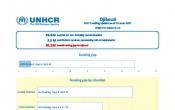Djibouti
Operation: Djibouti
Location
{"longitude":42,"latitude":12,"zoom_level":7}
Latest update of camps and office locations 21 Nov 2016. By clicking on the icons on the map, additional information is displayed.
Key Figures
| 2016 end-year results | |
| 100% | of population of concern was vaccinated against measles |
| 3,500 | children were enrolled in schools in the Somali refugee camps (including 1,579 girls) and some 400 Yemeni children were enrolled in schools in Markazi camp |
| 68 | Somali Refugees (17 families) were repatriated voluntarily |
| 38 | cases/220 individuals (32 Ethiopians, 188 Somalis ) were resettled to the United States of America |
| 12-15 | litres of potable water per person per day was available in the camps for Somali refugees |
| 2017 planning figures | |
| 100% | of known SGBV survivors falling within the mandate of the Office will receive appropriate support |
| 96% | of the refugee population will be vaccinated against measles |
| 90% | of primary school-aged refugee children will be enrolled in primary education |
| 80% | of national legislation relating to refugees will be made consistent with international standards |
| 10% | of people of concern (18-59 years) will have their own income generating solutions or be self-employed for more than 12 months |
| 20 | litres of potable water will be made available per person per day |
Latest Updates and Related Links
People of Concern
18%
Increase in
2016
2016
| 2016 | 25,862 |
| 2015 | 22,006 |
| 2014 | 24,362 |

[["Refugees",17683],["Asylum-seekers",8061],["Others of concern",118]]
Loading ...
Djibouti
< Back
2016
{"categories":[2012,2013,2014,2015,2016,2017],"budget":[26.92291952,26.23853782,26.95790235,41.39620267,31.98783036,33.78505653],"expenditure":[8.19790231,7.57613705,7.38017953,10.5087068,11.1475553,null]}
{"categories":[2012,2013,2014,2015,2016,2017],"p1":[26.92291952,26.23853782,26.95790235,41.39620267,31.98783036,33.78505653],"p2":[null,null,null,null,null,null],"p3":[null,null,null,null,null,null],"p4":[null,null,null,null,null,null]}
{"categories":[2012,2013,2014,2015,2016,2017],"p1":[8.19790231,7.57613705,7.38017953,10.5087068,11.1475553,null],"p2":[null,null,null,null,null,null],"p3":[null,null,null,null,null,null],"p4":[null,null,null,null,null,null]}
Loading ...
CHOOSE A YEAR
- 2015
- 2016
- 2017
Working environment
More than 60 per cent of the working age population in Djibouti are unemployed. The challenging economic situation, including the limited access to jobs, continued to have an impact on UNHCR’s work and on the ability of its people of concern to become self-reliant or access livelihoods. As a result, refugees and asylum seekers continue to depend heavily on the humanitarian assistance.Due to violence in Oromia Region of Ethiopia, Djibouti received an influx of some 4,900 new arrivals in 2016, majority of whom were of the Oromo ethnic group (89 per cent).
Djibouti is also a transit point for migrants, mainly from Ethiopia, crossing into Yemen and through Middle East further to Europe. It is estimated that between 5,000 and 6,000 migrants transit through Djibouti on a monthly basis.
Population trends
- The total Population of Concern to UNHCR stood at almost 26,000 by end of 2016, with refugees form Eritrea, Ethiopia, Somalia and Yemen.
- Close to 5,000 Ethiopian asylum-seekers were received in the last quarter of 2016, due to violence in Ethiopia.
Achiements and impact
- Adoption of the National Refugee Law by the Parliament in 2016 with subsequent promulgation by the President in January 2017.
- Under-5 mortality rate reduced from 3 to 0.09 in Ali Addeh refugee camp, and from 2.3 to 1.8 in Holl-Holl camp.
Unmet needs
- Due to funding constraints, no livelihood activities or vocational training were implemented.
- Likewise, durable shelters could not be provided to all refugees who have been living in the camps for more than two decades.
- Local integration of refugee children into the national system could not materialize. Discussions are still ongoing between UNHCR and the Ministry of Education on the curriculum to apply that would be in compliance with UNHCR policy while serving the best interests of the refugee children.
In Djibouti, the poverty rate is around 40 per cent and unemployment affects up to 60 per cent of the population. In this difficult environment, the country is hosting close to 15,500 refugees, composed of Somalis (77 per cent), Ethiopians (16 per cent), Eritreans (6 per cent) and others (1 per cent).
In 2016, UNHCR’s operational priorities are to:
- Support the adoption of a national law on asylum
- Ensure access to the territory for asylum-seekers by reinforcing the National Eligibility Commission
- Ensure the delivery of birth certificates for refugee children born in Djibouti
- Promote livelihoods and activities aimed at self-reliance
- Respond to the basic needs of refugees
- Promote Djibouti’s ratification of the statelessness conventions





